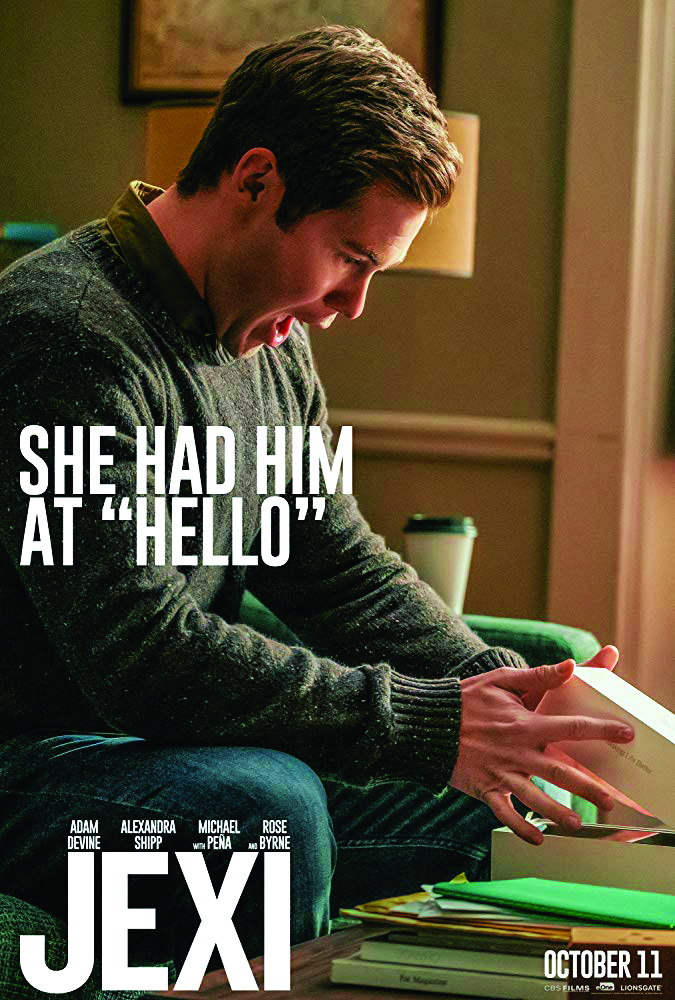

Imagine if Siri, Alexa or Google had a vendetta against you and actively attempted to ruin your life.
“Jexi” follows the main character Phil (Adam DeVine), a millennial office writer for a clickbait news site who, like many of us, is heavily dependent on his phone. Phil’s socially awkward nature makes it hard to interact with people outside of work. That all changes when his phone breaks and he purchases a new device with a vulgar artificial intelligence system called Jexi that knows practically everything about Phil. Imagine Jexi as a rude version of Siri.
The movie is set in San Francisco, with its tall buildings, busy traffic and people looking down at their phones, the setting fits just too perfectly with the movie’s motive to laugh at our addiction to technology. The cinematography during scenes shot in the city were raw and shaky, as if it were filmed on a phone instead of a professional camera, perhaps to mimic the fast-paced buzz noticeable in San Francisco.
The main plot line is simple; it revolves around the cliche boy-meets-girl trope…”
Contrasting with those scenes, beautiful, smooth aerial view shots of the Bay and California’s natural landscapes sprinkled throughout the film represent what many of us miss when absorbed by technology. Also, the scenes from hipster coffee shops in expensive neighborhoods to Phil being chased by a self-driving car hits close to home with recognizable references.
The main plot line is simple; it revolves around the cliche boy-meets-girl trope when Phil bumps into Cate (Alexandra Shipp), a bike-shop owner who is the exact opposite of Phil. She takes risks, rarely uses technology and is truly happy. Cate becomes Phil’s primary love interest and pulls him out of his addiction to the virtual world and ultimately changes him for the better as Phil finally comes to understand what love is. The development of this relationship is quick and shallow, but is understandable for an 84-minute film.
Though it has an unoriginal plot, “Jexi” varies from traditional romantic comedies with the technology being the antagonist to the two leads. Jexi sees and hears everything about Phil’s love life and slowly becomes jealous of Phil’s human relationship as she develops feelings for him. Jexi bullies Phil into staying with her forever, controlling his life through other operating systems. At one point, Jexi and Phil even end up getting intimate.
The director’s choice to give Jexi emotions for Phil was interesting, portraying the A.I. as a “crazy-ex girlfriend” character that does everything in her power to ruin Phil’s life. Jexi abuses Phil, but she ultimately motivates him to pursue different life without technology overuse.
Though some of the raunchy jokes in “Jexi” did deserve some laughs, the banal and predictable modern romantic comedy style was not memorable
In terms of the humor, the movie was all over the place. From Jexi’s outrageous dirty jokes to the phone store employee (Wanda Sykes) comparison of hipster phone addicts, each character seemed to have different, ridiculous humor. DeVine’s comic facial expressions were an added bonus, embracing Phil’s uncritical and gullible personality.
Though some of the raunchy jokes in “Jexi” did deserve some laughs, the banal and predictable modern romantic comedy style was not memorable. However, if we look beyond the R-rated, light-hearted comedy, the underlying message that life shouldn’t be experienced through a phone screen but rather through raw human connections is pertinent to the young generation in our technology-dependent society, especially in the Silicon Valley. “Jexi” makes us reconsider our reliance, for example, on virtual assistants such as Alexa, Siri and Cortana that only gives us an unhealthy relationship between us and technology.





